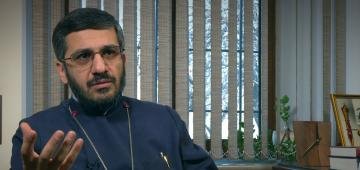 |
The First Commandment: The Foundation of the Ten CommandmentsJustice comes from God, which we accept. How to love God with your heart, soul, and whole being? Archimandrite Ruben Zargaryan comments. |
 |
Prayer: A Journey to GodWhat is prayer, what example of prayer does Christ give us in the Garden of Gethsemane, and how do we gain experience in prayer over the years? Archimandrite Ruben Zargaryan comments. |
 |
Command and freedom“I am your God, who brought you out of the house of slavery.” How does this first commandment relate to the idea of freedom and how is it interpreted by Christ? Father Ruben Vardapet Zargaryan speaks on this. |
 |
Don't desire- part 2The commandment "Thou shalt not covet" does not mean to kill the natural desire within you, but rather to be temperate. Know yourself, your desires, and your limits, so that you may thereby respect yourself, your surroundings, and your society. Fr. Archimandrite Ruben Zargaryan comments. |
 |
Don't desire, part 1Desire is the most fundamental ability and characteristic of human existence. When the Holy Scripture tells us not to desire, what specific circumstances does it point to? Archimandrite Ruben Zargaryan speaks on this. |
 |
The building of the Mesrop Mashtots MatenadaranThe building of the Yerevan Mesrop Mashtots Research Institute-Museum of Ancient Manuscripts opened its doors in 1959, becoming one of the symbols of Yerevan. It still amazes with its unique architecture, sculptural and pictorial designs. The design and construction of the building was a long and challenging process, but architect Mark Grigoryan managed to overcome obstacles and create a unique structure that combines traditional Armenian architecture with the functional features of a modern scientific institute and museum. |
 |
Light that guides lifeHow does Jesus, as the star of Bethlehem, continue to illuminate our path, remaining the inseparable companion of all of us? Archimandrite Ruben Zargaryan speaks on this. |
 |
What did Christ bring us?How does the Nativity of Christ tell us about God and then outline the path we must take? Fr. Ruben Vard Zargaryan comments. |
 |
Lord, add our faith, part 2Why is faith considered an integral part of human life, regardless of religious, gender, age, or cultural differences? |
 |
The Greatest Commandment
Love to the end, love to the end. And this is very logical. Why? If it is true that man is the image of God, then every human being is born in the image of God, because man is created that way and is called to be like God. If we are the image of God, we cannot love God, but at the same time despise his image on earth. What is the great commandment, how do we apply it in our lives? Archimandrite Ruben Zargaryan speaks on this.
|
 |
The voice of many is the voice of God?
The voice of many is not the voice of God, but the voice of the ruling system. Barabbas, who was a robber, a rebel, a false ideal of liberation, a false symbol. The liberation proposed by Jesus was not this false liberation, but the people gave preference to the false path of liberation, which later cost them tragedy.
How does the Holy Scripture prove that the voice of the people does not express the voice of God? Archimandrite Ruben Zargaryan speaks on this.
|
 |
Babylon, "Gate of the Gods"
The building of the tower of Babylon was the first collective sin. Here, a manifestation of sin takes place in a social, political, and collective sense. If in the Adam and Eve episode, or in the Cain and Abel episode, individual sins are committed, then here a collective sin is committed, which is the sin of power. In any collectivity, there is always a problem of abuse of power and the word of the power that has dominion passes. What is the contrast between the Tower of Babel and the ceremonies of Pentecost, what similarities do they have with our life today? Archimandrite Ruben Zargaryan speaks on this.
|
